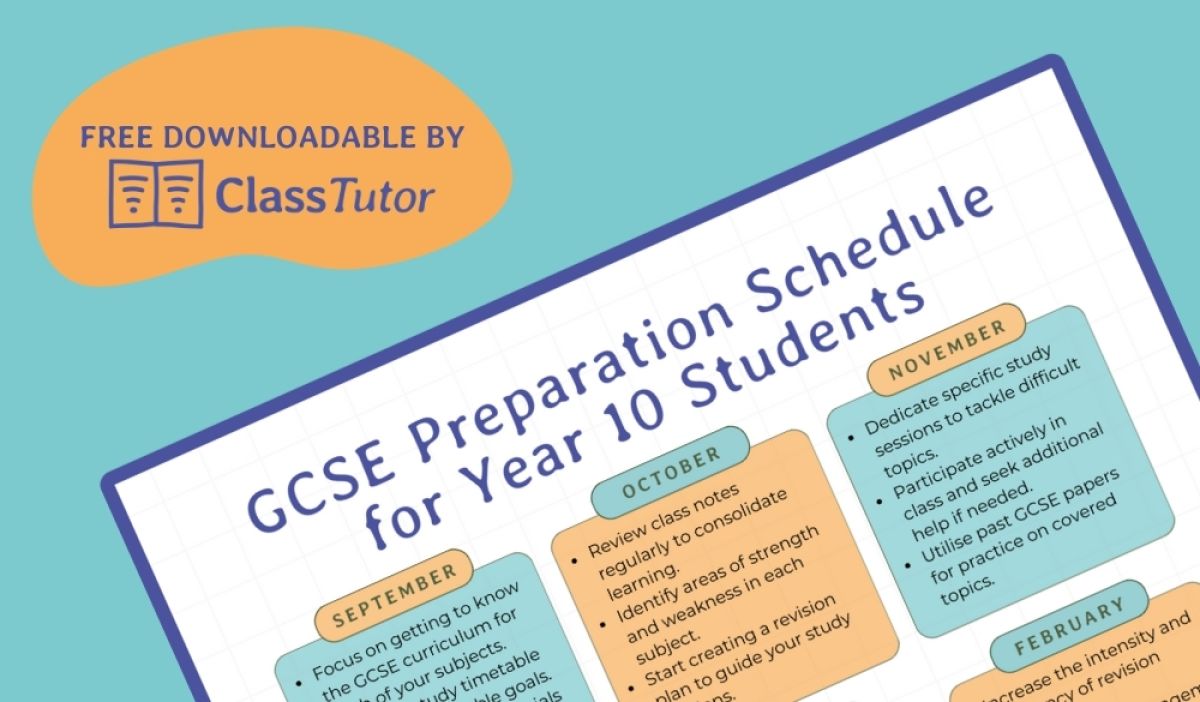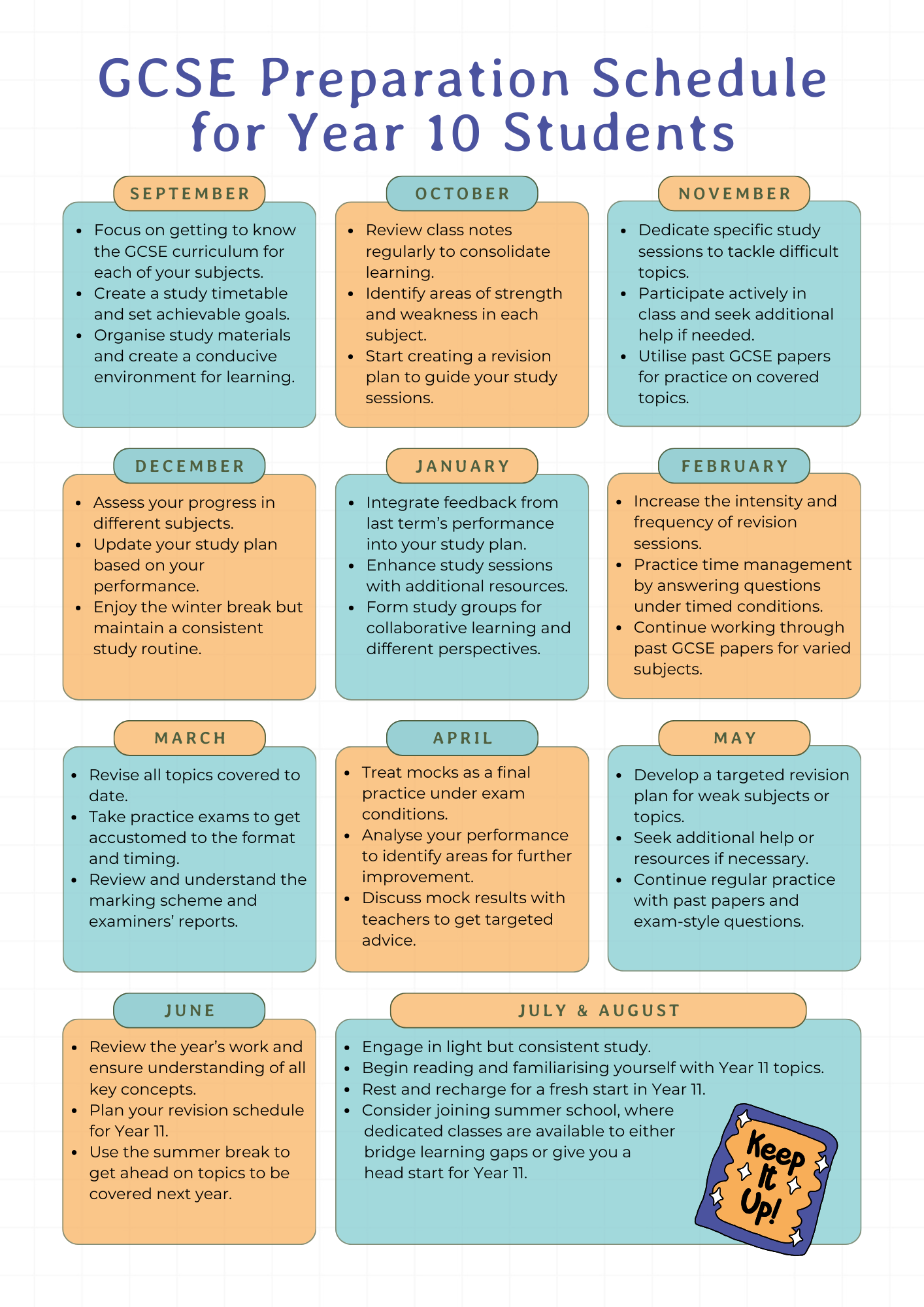GCSE Preparation Schedule for Year 10 Students

Navigating through the academic year as a Year 10 student in the UK can be a challenging yet exciting journey. With the goal of excelling in the GCSEs at the end of Year 11, it’s essential to have a well-planned approach to your studies.
This article breaks down the year into a month-by-month guide, providing actionable steps to ensure comprehensive preparation for your GCSEs.
September (Year 10 Begins): Setting the Stage
The beginning of Year 10 is all about laying a solid foundation.
- Focus on getting to know the GCSE curriculum for each of your subjects.
- Create a study timetable and set achievable goals.
- Organise study materials and create a conducive environment for learning.
October: Building Foundations
This month is key for building upon the initial understanding of your subjects.
- Review class notes regularly to consolidate learning.
- Identify areas of strength and weakness in each subject.
- Start creating a revision plan to guide your study sessions.
November: Deepening Understanding
Now it’s time to delve deeper into the subjects, especially focusing on challenging areas.
- Dedicate specific study sessions to tackle difficult topics.
- Participate actively in class and seek additional help if needed.
- Utilise past GCSE papers for practice on covered topics.
December: Review and Reflect
The end of the first term is a great time to review and consolidate what you’ve learned.
- Assess your progress in different subjects.
- Update your study plan based on your performance.
- Enjoy the winter break but maintain a consistent study routine.
January (Year 10 Continues): Gaining Momentum
Realign your strategies this term to focus more on improvement areas, and consider enrolling in tuition early to ensure a comprehensive grasp of all subjects.
- Integrate feedback from last term’s performance into your study plan.
- Enhance study sessions with additional resources, such as educational videos or online platforms like ClassTutor.
- Form study groups for collaborative learning and different perspectives.

February: Intensifying Study Efforts
Build upon the foundational knowledge established in the first term.
- Increase the intensity and frequency of revision sessions.
- Practice time management by answering questions under timed conditions.
- Continue working through past GCSE papers for varied subjects.
March: Preparing for Mocks
Get ready for the mock exams, which are typically held after the Easter break.
- Revise all topics covered to date.
- Take practice exams to get accustomed to the format and timing.
- Review and understand the marking scheme and examiners’ reports.
April: Mock Exams
Mock exams are crucial practice for the actual GCSEs.
- Treat mocks as a final practice under exam conditions.
- Analyse your performance to identify areas for further improvement.
- Discuss mock results with teachers to get targeted advice.
May: Strengthening Weak Areas
Focus on strengthening areas highlighted as weak during the mocks.
- Develop a targeted revision plan for weak subjects or topics.
- Seek additional help or resources if necessary.
- Continue regular practice with past papers and exam-style questions.
June: End of Year 10
Consolidate learning and begin preparing for Year 11.
- Review the year’s work and ensure understanding of all key concepts.
- Plan your revision schedule for Year 11.
- Use the summer break to get ahead on topics to be covered next year.
July & August: Summer Break
Use the summer break to keep the mind active and prepare for the final GCSE year by joining a summer school, where dedicated classes are available to either bridge learning gaps or give you a head start for Year 11.
- Engage in light but consistent study.
- Begin reading and familiarising yourself with Year 11 topics.
- Rest and recharge for a fresh start in Year 11.
September (Year 11 Begins): Kickstarting GCSE Year
Start Year 11 focused and ready for intensive GCSE preparation. For your Year 11 schedule, please check our our ‘Tips and Insights’ page.
- Refine your study timetable to align with GCSE exam dates.
- Begin intensive revision of Year 10 topics.
- Establish a routine that balances schoolwork, revision, and personal well-being.
Your Year 10 is a pivotal time in your academic journey leading up to the GCSEs. With a structured approach, regular revision, and the right mindset, you can navigate through the year effectively.
Remember, consistency in study habits and adapting strategies as needed are key to successful preparation. Stay organised, seek help when necessary, and balance your studies with adequate rest and leisure activities.
You’ve got this!
CLICK TO DOWNLOAD YOUR FREE PREPARATION SCHEDULE

